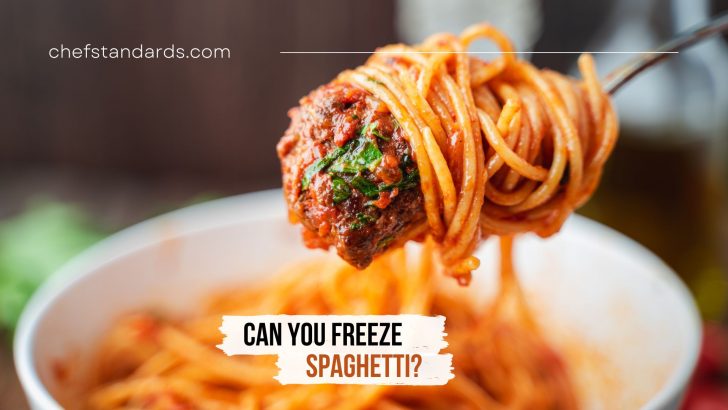When all else fails, one thing is for sure: pasta will always be there for you! The only problem with pasta is dealing with leftovers when you cook too much of it. That’s when you ask yourself: Can you freeze spaghetti?
QUICK ANSWER: Yes, you can freeze spaghetti. This is a great option if you have leftover spaghetti and don’t want to waste it.
Many people think that if they freeze pasta, it will be ruined. In fact, frozen pasta will reheat better and have more flavor. The best of all is that the process of freezing pasta is not difficult at all!
How To Freeze Spaghetti In 4 Easy Steps
Freezing leftover pasta is a great way to preserve it for future dishes and save time on cooking. Here is how I do it:
1. For the best results, cook your spaghetti al dente. What does this mean? Al dente is when your pasta still has a bit of firmness to it that you can chew. You should do the same before freezing pasta salad. If you still aren’t sure how to achieve al dente texture, check the video below.
2. Cool it off. Shake off any excess water before letting your pasta cool. Let your pasta dry and cool at room temperature. Use a baking sheet, parchment paper, or pasta dish and put the pasta in a single layer for easier cooling and drying.
3. Place the cooked pasta into a freezer-safe container or bag. Label it with the date.
PRO TIP: Make sure that the container is airtight because this will keep the spaghetti from getting freezer burned.
4. Be mindful of the pasta sauce or pesto. The perfect way to store spaghetti sauce is to keep your tomato sauce (or any other sauce) separately stored from your pasta.
Often, this isn’t possible, so make sure your airtight container or freezer-safe bag has as much air removed as possible.
If you already have a whole meal prepared and you think that there will be a lot of leftovers, then freeze the whole dish. This means that parmesan cheese, together with meatballs and fresh pasta can all be stored in Ziploc bags and put in the freezer.
How Long Can Spaghetti Last In The Freezer?
How long spaghetti in the freezer will last depends on a number of factors, including the type of spaghetti, the temperature at which it is frozen, and how it is stored.
• Sauce-free spaghetti: You can freeze sauce-free spaghetti for up to 3 months. When you freeze spaghetti with other ingredients, it shortens its shelf life.
• Spaghetti with sauce and meatballs: You should freeze spaghetti with sauce and meatballs for 2 months ideally, but no longer than 3 months. Make sure your storage containers are clean and properly marked with the cooking time and freezing time.
• Freezing at a different temperature: The second thing to consider is the temperature at which the spaghetti is frozen. If you freeze food at a higher temperature, it will last shorter. Contrary to it, freezing food at a lower temperature will help it last longer in the freezer.
#1 NOTE: Different types of pasta have different water content and, therefore, different freezing points. For example, fresh egg noodles will freeze at a lower temperature than dry pasta such as lasagna noodles or fettuccine.
#2 NOTE: “Frozen leftovers can lose moisture and flavor when stored for longer times in the freezer”, as stated by the USDA.
4 signs of spoilage in spaghetti
If you aren’t sure whether it’s safe to consume your spaghetti, then look for these signs of spoilage:
1. Slimy or gooey texture: According to Healthline, “one of the most telling signs of expired pasta is that it has become slimy or gooey, which usually occurs right before visible mold begins to grow.”
2. Discoloration: If you notice any discoloration such as a whitish or grayish hue, your pasta is spoiled and you shouldn’t consume it.
3. Mold: Mold on your pasta is a definite sign of spoilage. If you see any mold, discard your spaghetti immediately.
4. Bad smell: If the smell of your pasta upsets your stomach, you should throw it in the trash because it is spoiled.
Thawing And Reheating Frozen Spaghetti
According to the USDA, “Foods should be reheated thoroughly to an internal temperature of 165 °F or until hot and steaming.” Here are my three favorite ways for thawing frozen spaghetti:
• In the fridge. Put frozen spaghetti in the refrigerator in the evening and they will be ready in the morning.
Here’s what the USDA says about thawing food in the refrigerator: “Refrigerator thawing takes the longest but the leftovers stay safe the entire time. After thawing, the food should be used within 3 to 4 days or can be refrozen.”
• At room temperature. Leave frozen spaghetti at room temperature in the morning and it will thaw by lunchtime. For speedy results, put the freezer bag or container in cold water. You should choose this thawing method only if you don’t plan on refreezing spaghetti.
• Microwave. If you’re reheating, you should microwave spaghetti at medium heat for 1 to 1 ½ minutes. Use a microwave-safe plate or a container. But before doing so, watch the video below.
Conclusion
Can you freeze spaghetti? Yes, you can. For the best results, you should cook your pasta al dente, and place it into a freezer container or bag.
If you can, keep your sauce or meatballs separate from the spaghetti in the freezer because freezing them together may shorten its shelf life.
You can freeze sauce-free spaghetti for up to 3 months, whereas spaghetti with sauce and meatballs can last for 2 months ideally, but no longer than 3 months.
Enjoy your meal!


